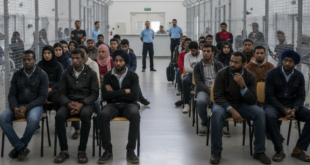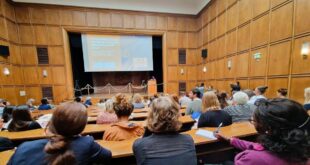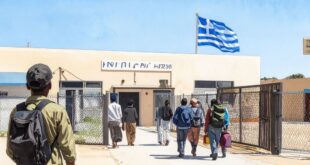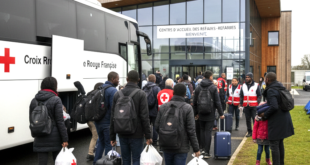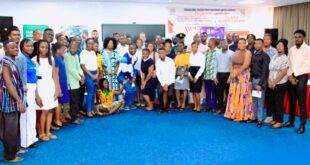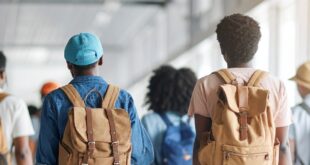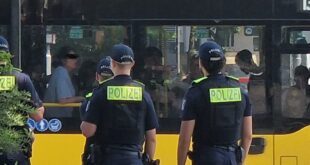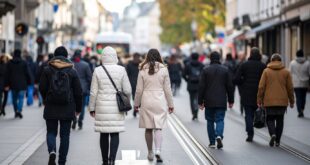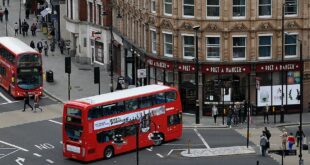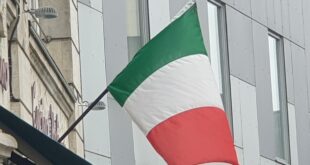A migrant’s personal story of return, resolution, and resilience
Tübingen – It’s a warm summer day in 2021. Musa Coker sits in the office of his return counsellor. He has visited the small office in Southwest Germany multiple times this year, seeking information, advice and counsel and discussing his return to the Gambia, his country of origin. Today, Musa will share his migration story in a video call with the International Organization for Migration (IOM) so that others can learn from his experience. It will not be easy—after all, motivations for migration and return are very personal and often emotional. “But I will sure try,” he says with a smile.
Like many other migrants, Musa’s story begins with hope for a better life—one with more opportunities. Nearly a decade ago, he began thinking about leaving the Gambia for work. He was still very young. “I wanted to find a job,” he says, “so I went to Senegal.”
After working for some time as a bus controller, he moved on to Libya. But with growing instability and Libya’s economy faltering, the working conditions in Tripoli were harsh and precarious. After enduring many difficulties, Musa crossed to Europe by boat and arrived in Italy on 4 February 2014. “I will never forget the date,” he says.
A Troubled Time in Europe
In Italy, Musa and about fifty other people first stayed in temporary housing, where they were given food, but not the employment assistance he had hoped for. At first, Musa was not considering moving on to Germany. But he was driven by the hope of finding work to support his family back in the Gambia. Heeding the advice of other migrants, he continued his journey north.
In the years that followed, life in Germany came with its own challenges and unmet expectations. “When I was working, I was not allowed to continue for long,” Musa recounted. While employed as a road builder in Tübingen, he had trouble connecting with fellow employees. Musa experienced racism and a major cultural divide in the workplace. Thinking that he would easily fit in, find a job, send money home, and live the good life in Europe, Musa instead struggled with the administrative system in Germany and had to constantly fight to obtain a work permit.
Musa was employed for only two of the seven years he spent in Germany. Eventually, his asylum application was rejected, and he was told that he had to leave the country. “After that, everything was catastrophic,” he says. Coming to terms with the fact that life in Europe would not work out was difficult. “You can’t stay in a country where you have no documents and can’t work. That’s not why I travelled.”
Instead of staying in Germany without a permit, Musa eventually reached out to a return counsellor in Tübingen to discuss the possibility of returning to the Gambia. “I heard about IOM from other migrants and had a friend who had returned to Senegal. I decided that if these people help me, I will go back to the Gambia. I will start little by little,” he recounted.
Helping the Gambian People
After receiving counselling and learning about the available return and reintegration assistance, Musa decided that he would return to the Gambia. He developed a business plan to open a farm that would help people in his community change their lives for the better. His time in Germany showed him how Germans build and grow businesses, and he plans to adapt all that he learned to the Gambian context. “It is a small country, easy to develop”, he says, adding, “It is important for me to help, not just to win.” Building on his experience helping on farms, Musa began establishing a link between fowl breeders in Germany and African customers who cannot speak German.
As part of this assistance, Musa took a course in marketing, bookkeeping and customer service through Newplacement International, a programme funded by the Deutsche Gesellschaft für Internationale Zusammenarbeit (GIZ). With this support, Musa felt more hopeful about returning. “I want people to see that there is a man who was in Germany that went back to create his business. When I go back to the Gambia, I will achieve something,” he stated.
The Return to the Gambia
Welcomed warmly by his friends and family, Musa’s most memorable moment was seeing his mother again. “I returned to the Gambia for my family, especially my mother and my son.” Since his return, Musa is taking steps to launch his business. He intends to help less privileged young Gambians from his community. “Let’s invest in the youth, who can be useful for both the Gambia and abroad,” he explains.
While waiting for the rainy season to pass to get started on farming, Musa is keeping busy. He recently invested in a car that he is operating as a taxi to make money while planning his business. His biggest hope lies in livestock and agriculture, through which “Gambians can give back to the country,” he says. Musa hopes that others will find courage from his story and see that with the proper education and training, young Gambians can work to provide for their families and contribute to the Gambia’s development.
Learn More
Many people share Musa’s experiences in Europe. Some have their asylum claims rejected, others are unable to integrate in Germany, while even more live far removed from any type of support system. The expectations of living and working in Europe are often not met.
If you or someone you know is considering returning to your country of origin, you can receive financial, organizational and reintegration assistance. Check here for more information or get in touch by phone at +49 911 943-0. Counselling centres are available across Germany. You can easily find your nearest return counselling centre, and learn more about the assisted return and reintegration programmes available to you based on the country you are returning to.
IOM’s return and reintegration programmes are financed by the Federal Office for Migration and Refugees (BAMF), the German Government, the Federal States, and the European Union (EU).
Supplemental reintegration projects such as ERRIN might also be suitable for you. The programme is carried out by BAMF in cooperation with GIZ.
 THE AFRICAN COURIER. Reporting Africa and its Diaspora! The African Courier is an international magazine published in Germany to report on Africa and the Diaspora African experience. The first issue of the bimonthly magazine appeared on the newsstands on 15 February 1998. The African Courier is a communication forum for European-African political, economic and cultural exchanges, and a voice for Africa in Europe.
THE AFRICAN COURIER. Reporting Africa and its Diaspora! The African Courier is an international magazine published in Germany to report on Africa and the Diaspora African experience. The first issue of the bimonthly magazine appeared on the newsstands on 15 February 1998. The African Courier is a communication forum for European-African political, economic and cultural exchanges, and a voice for Africa in Europe.




